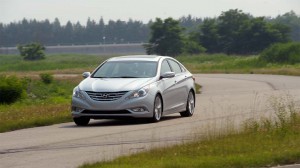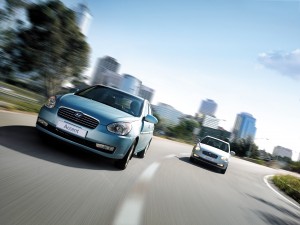Hyundai is recalling nearly 500,000 Sonata sedans because a manufacturing problem could cause their engines to fail.
Hyundai has notified the National Highway Traffic Safety Administration that engines produced at its powertrain plant in Alabama may not have been machined properly. As a result, metal debris can block the flow of oil to the connecting rod bearings. That could cause the engines to stall and, in turn, lead to a crash.
The problem affects both 2.0-liter and 2.4-liter engines used in 470,000 midsize Sonata sedans sold during the 2011 and 2012 model-years. Those vehicles were all assembled by Hyundai in the United States.
The problem was flagged by consumers who reported hearing noise as the engines began to fail. The maker was advised by NHTSA that it considered the defect a safety problem because vehicles could fail while being driven at high speeds.
Hyundai plans to issue formal recall notices at the beginning of November, but owners may have to wait to make repairs until replacement parts become available. Dealers will inspect the vehicles and repairs will be made at no cost to consumers. Hyundai also said it will extend the engine warranty to 10 years or 120,000 miles.
(Automakers expecting strong September sales. Click Here for more.)
Separately, the Korean carmaker announced it will recall about 100,000 of the smaller Accent models from the 2009 to 2011 model-years because their bright light switch might fail. That not only could cause the brake lights not to work but it would mean cruise control would no longer be deactivated by hitting the brake pedal.
Since the brake switch is used by the vehicle’s transmission interlock system, its failure also could make it difficult to shift the vehicle out of the “Park” position, as well.
Repairs for the brake switch problem will begin in November, again at no charge to consumers.
Hyundai says it has no reports of crashes or injuries linked to either of the defects announced today.
(Click Here for the latest on the VW scandal.)
The combined announcement, totaling nearly 600,000 vehicles, is just the latest in a growing list of large-scale recalls automakers have announced recently. All told, the auto industry recalled about 64 million vehicles in 2014, double the previous all-time record. The industry appears to be on track to near, and possibly exceed that tally in 2015.
General Motors was a major factor in breaking the record last year, the maker announcing more than 70 separate recalls in 2014. This year, GM’s pace has slowed, but facing pressure from increasingly wary regulators, other manufacturers have been acting more quickly on problems that might previously have been ignored. Hyundai, for example, initially didn’t plan to label the engine manufacturing problem a safety issue, which meant it wouldn’t have required a recall. It shifted position under pressure from NHTSA.
A wide range of manufacturers have been involved in six-figure recalls this year. But the big problem for 2015 involves faulty airbags using inflators produced by Japanese supplier Takata. All told, about 27 million vehicles equipped with those bags have been targeted for recall so far, but an ongoing investigation could yet add millions more.
(Is your diesel dirty? Click Here for that and other questions about the VW crisis.)



BUY AMERICAN !!! BUY THE VEHICLE NOT THE PRICE TAG.
These engines were made in Alabama, which, despite being a low wage, anti-union bastion of conservatism, is technically a state in the United States of “America”.
Exactly. Why these factories get away with sub-standard compensation to other auto factories is unknown but clearly exploitation of the locals.
As far as the engines go this appears to be a cleaning issue not a machining issue if metal debris were left to block the oil supply lines causing an oil restriction and fatal engine damage. In either case it doesn’t matter where the car or engine is manufactured these issues could occur if proper engine assembly is not employed.
Always tickled to see the Detroit mentality in action. A Buick that is made in Korea, or a Ford that is 75% Mexican parts is considered ‘American’, while a BMW made in South Carolina is a ‘foreign’ car. That flawed logic is why those of us out West just shake our heads. That flawed logic is really not helping you to make your case.
It does put American workers to work but the profits go overseas. Buy American.
These recalled vehicles were produced 4-5 years ago (2001-2012 models). If there was major problems we would see Sonata’s by the side of the road everywhere.